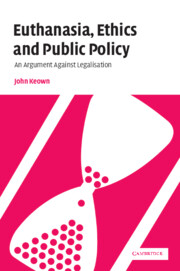Book contents
- Frontmatter
- Contents
- Preface
- Foreword
- Acknowledgments
- Table of cases
- List of abbreviations
- Introduction
- PART I Definitions
- 1 ‘Voluntary euthanasia’
- 2 Intended v. foreseen life-shortening
- 3 ‘Physician-assisted suicide’
- PART II The ethical debate: human life, autonomy, legal hypocrisy, and the slippery slope
- PART III The Dutch experience: controlling VAE? condoning NVAE?
- PART IV Australia and the United States
- PART V Expert opinion
- PART VI Passive euthanasia: withholding/withdrawing treatment and tube-feeding with intent to kill
- Conclusions
- Afterword
- Bibliography
- Index
2 - Intended v. foreseen life-shortening
Published online by Cambridge University Press: 20 July 2009
- Frontmatter
- Contents
- Preface
- Foreword
- Acknowledgments
- Table of cases
- List of abbreviations
- Introduction
- PART I Definitions
- 1 ‘Voluntary euthanasia’
- 2 Intended v. foreseen life-shortening
- 3 ‘Physician-assisted suicide’
- PART II The ethical debate: human life, autonomy, legal hypocrisy, and the slippery slope
- PART III The Dutch experience: controlling VAE? condoning NVAE?
- PART IV Australia and the United States
- PART V Expert opinion
- PART VI Passive euthanasia: withholding/withdrawing treatment and tube-feeding with intent to kill
- Conclusions
- Afterword
- Bibliography
- Index
Summary
Distinguishing intention from foresight
In both ordinary language and human experience intention is different from mere foresight. Aiming to bring about a consequence is not the same as simple awareness that it may or will occur. The difference between the two states of mind is easily illustrated. There can, first, be foresight without intention. To take an example given by the former Law Lord, Lord Goff: when Montgomery ordered his troops to invade France on D-Day, he foresaw that many of them would be killed but he obviously did not intend that any of them should be killed. Again, the tipsy guest at the wedding reception who drinks too much of the free-flowing fizz foresees the inevitable hangover but hardly intends it. The discomfort of having a tooth extracted by the dentist is always foreseen, never intended.
Conversely, there can be intention without foresight. An assassin may intend to shoot a political leader who is giving a speech hundreds of yards away without foreseeing that the bullet will find its mark. I can intend to make you interested in this sentence without foreseeing that you will be. You can buy a ticket intending to win the lottery without foreseeing that you will.
Moral difference
No less importantly, whether a bad consequence is intended or merely foreseen can make a major difference to the morality of one's conduct. Consider the actions of two dentists, the kindly Mr Fill and the cruel Mr Drill.
- Type
- Chapter
- Information
- Euthanasia, Ethics and Public PolicyAn Argument Against Legalisation, pp. 18 - 30Publisher: Cambridge University PressPrint publication year: 2002

